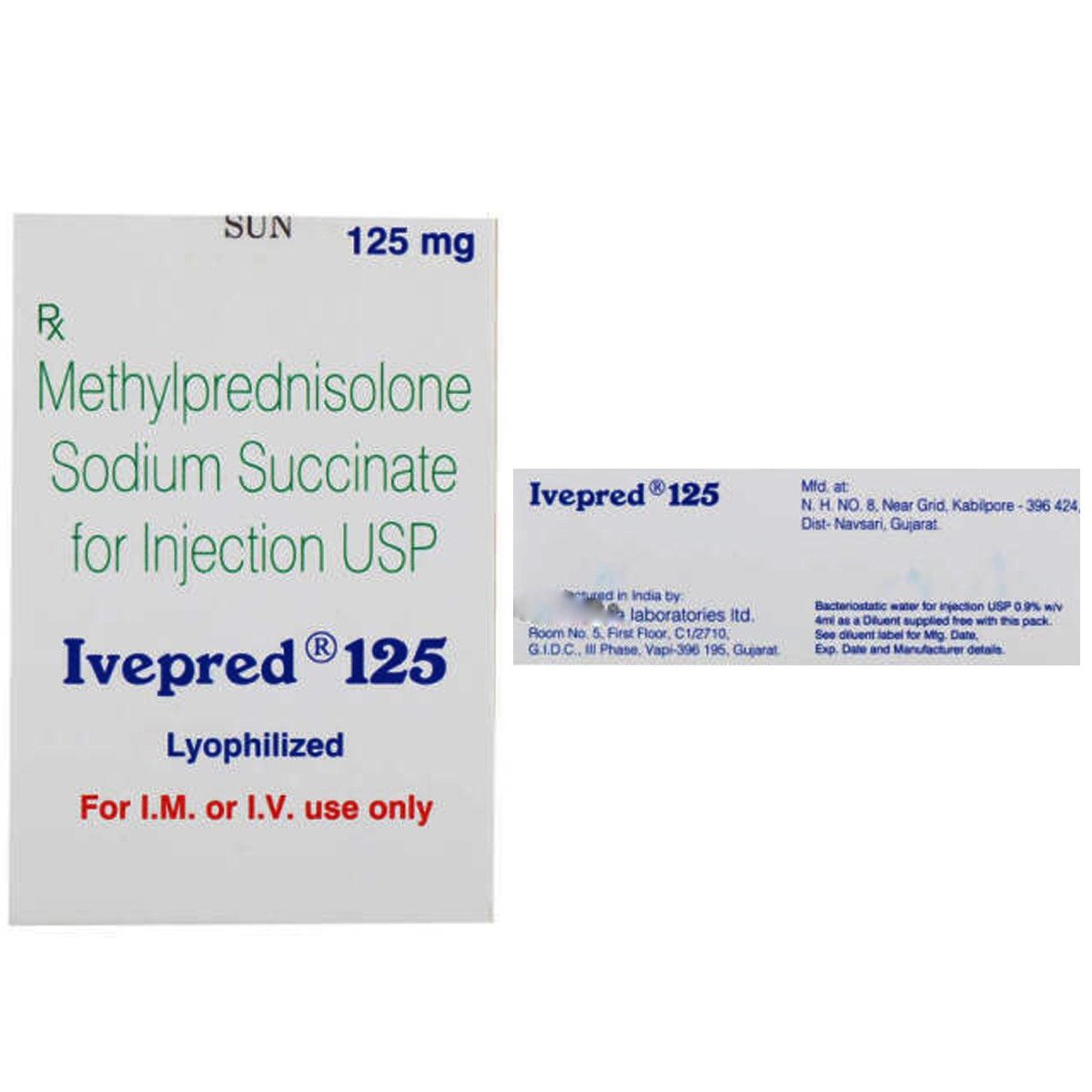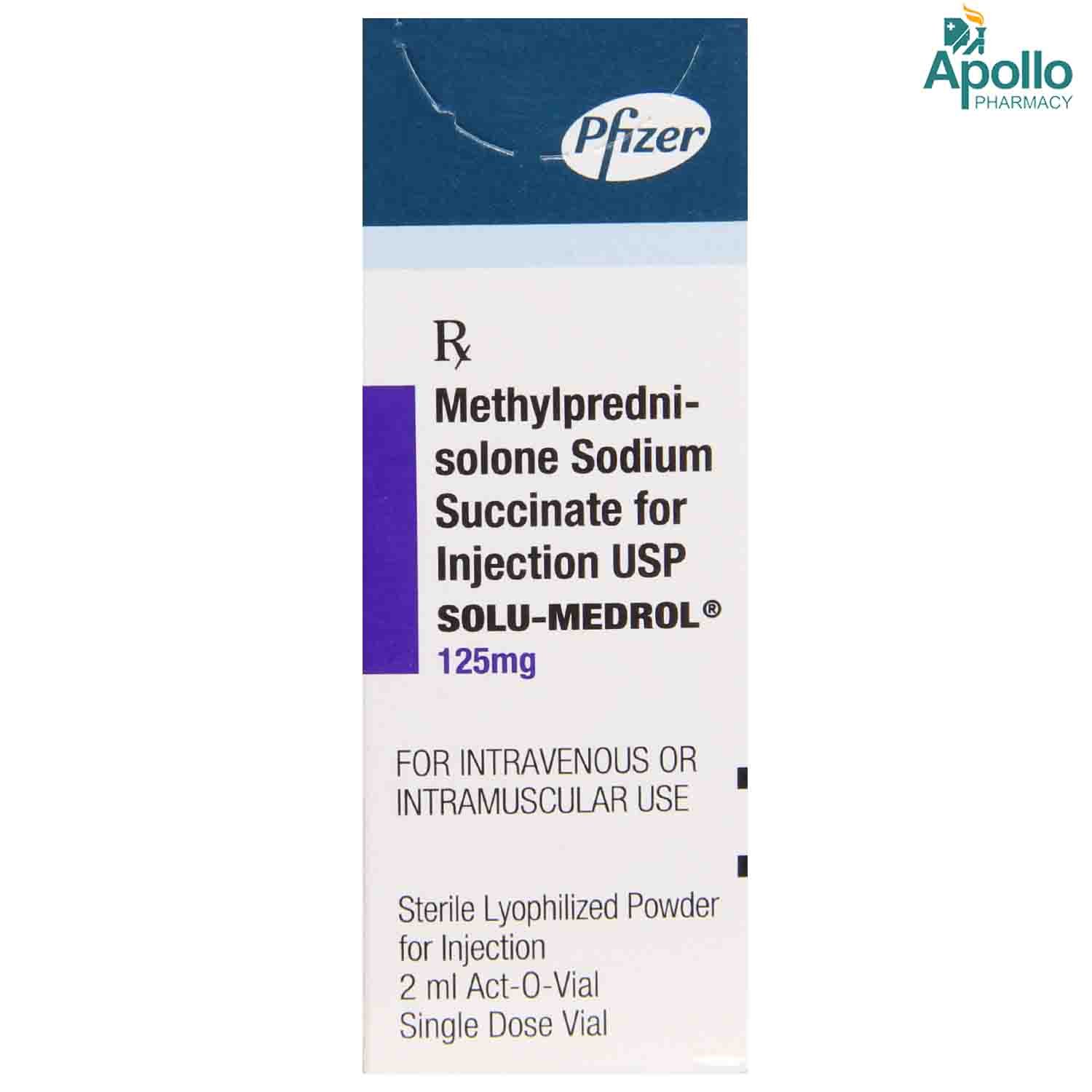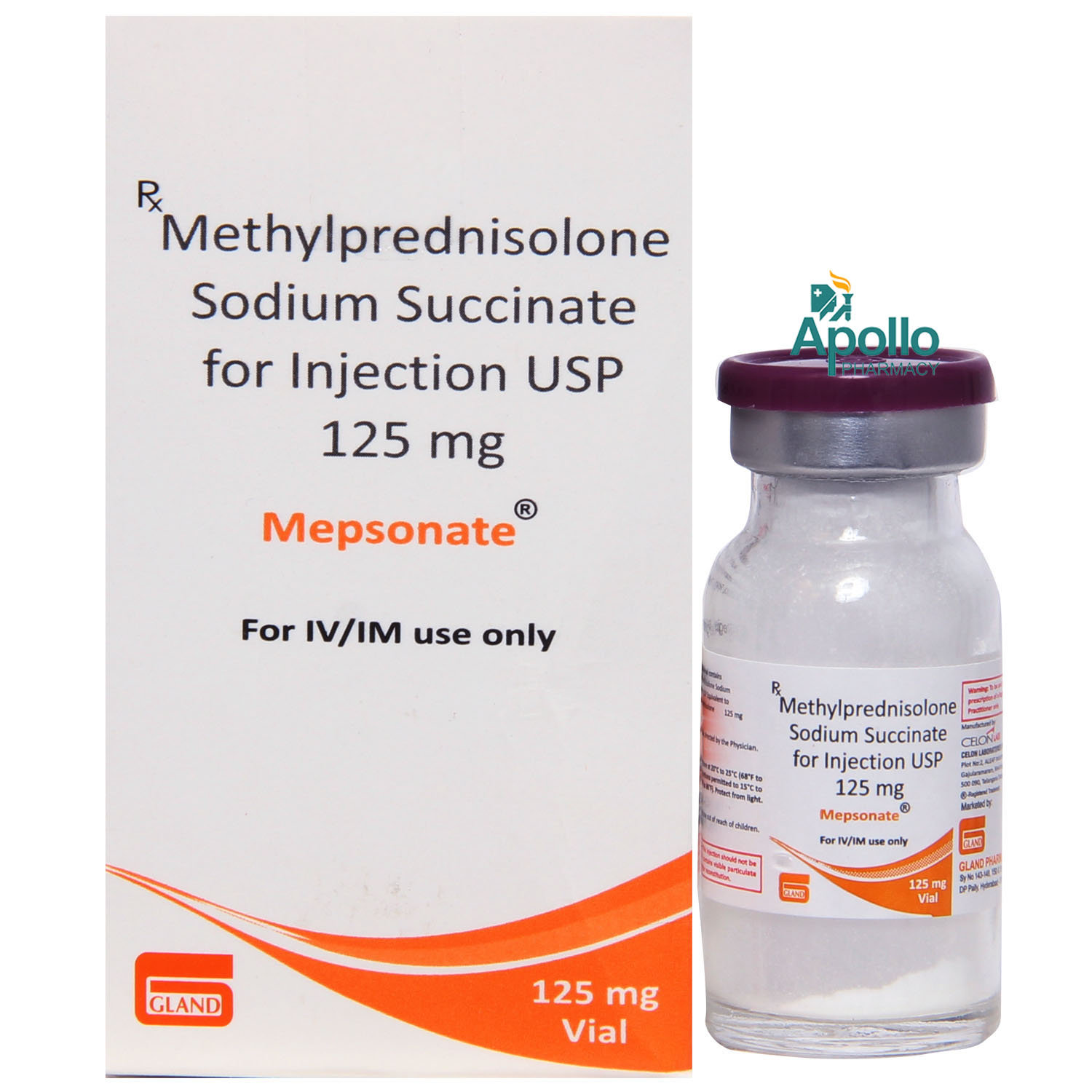Ivepred 125 Injection

MRP ₹475
(Inclusive of all Taxes)
₹71.3 Cashback (15%)
know your delivery time
Provide Delivery Location
Composition :
Manufacturer/Marketer :
Consume Type :
Expires on or after :
Return Policy :

Secure Payment

Trusted by 8 Crore Indians

Genuine Products
Therapeutic Class
Country of origin
Manufacturer/Marketer address
Author Details
We provide you with authentic, trustworthy and relevant information
Disclaimer
Alcohol
Safe if prescribed
No interaction was found. However, limit alcohol consumption as a precautionary measure.
Pregnancy
Consult your doctor
Inform your doctor if you are pregnant or suspect or planning pregnancy. Your doctor will weigh the benefits and potential risks before prescribing Ivepred 125 Injection.
Breast Feeding
Consult your doctor
Ivepred 125 Injection is considered safe to be used during breastfeeding. If you are breastfeeding, inform your doctor before receiving this injection. Your doctor will weigh the benefits and potential risks before prescribing Ivepred 125 Injection.
Driving
Safe if prescribed
Ivepred 125 Injection has no or insignificant effect on one's ability to drive or operate machinery. In rare cases, Ivepred 125 Injection may cause blurred vision or other visual disturbances. If you experience these symptoms, do not drive or operate machinery until you are alert.
Liver
Consult your doctor
If you have a history of liver diseases/conditions or ongoing liver conditions, inform your doctor before receiving Ivepred 125 Injection. Your doctor may adjust the dose or prescribe a suitable alternative if necessary based on your condition.
Kidney
Consult your doctor
If you have a history of kidney diseases/conditions or ongoing kidney conditions, inform your doctor before receiving Ivepred 125 Injection. Your doctor may adjust the dose or prescribe a suitable alternative if necessary based on your condition.
Children
Safe if prescribed
Ivepred 125 Injection is generally not recommended for use in children because it can delay growth and development as well as severe headaches with blurred vision or temporary visual problems. Before prescribing this medication to your child, your paediatrician may weigh the benefits and risks.
Product Substitutes
About Ivepred 125 Injection
Ivepred 125 Injection belongs to the corticosteroid drug class. It is used to treat symptoms associated with allergic reactions or inflammatory conditions. Ivepred 125 Injection is primarily used to treat arthritis, tennis elbow, and golfer's elbow, which cause swelling and pain in the joints and tendons. It is also useful in treating severe allergic reactions, asthma, ulcerative colitis, and Crohn's disease (inflammatory bowel disease).
Ivepred 125 Injection contains methylprednisolone, a corticosteroid medicine. It works by suppressing the migration of certain chemical messengers in the body that cause inflammation and allergic conditions; thus, it effectively treats various medical conditions associated with allergies and inflammation.
Ivepred 125 Injection is administered by a doctor in a hospital setting. Do not self-administer. It shows side effects like depression, suicidal thoughts, anxiety, sleeping disorders, difficulty in thinking or being confused, memory loss, hallucinations (seeing or hearing things that do not exist), and feeling high (mania) or mood swings. Most of these side effects do not require medical attention and gradually resolve over time. However, if any of these side effects are persistent, consult your doctor.
Inform your doctor before receiving Ivepred 125 Injection if you are allergic to corticosteroids or methylprednisolone, if you just had a vaccination or have a vaccination planned, or if you have a viral infection such as measles or chickenpox, shingles, or any other medical condition. Stay away from people who have chickenpox or shingles. Consult your doctor immediately if you come into contact with chickenpox or shingles patients. If you are pregnant or breastfeeding and suspect pregnancy or planning pregnancy, inform your doctor before receiving this medicine. Ivepred 125 Injection is generally not recommended for use in children as it may delay growth and development and cause severe headaches with blurred vision or temporary visual problems in children. Your paediatrician may weigh the benefits and risks before prescribing this medicine to your child.
Uses of Ivepred 125 Injection
Medicinal Benefits Mweb
Key Benefits
Ivepred 125 Injection plays a vital role in treating a wide range of allergic reactions and inflammation in the body by blocking certain chemical messengers known as 'histamine,' which is naturally involved in allergic reactions. Ivepred 125 Injection is accepted to treat various medical conditions such as allergies, joint inflammation (arthritis, golfer's elbow), breathing problems (e.g., asthma), and intestinal problems (e.g., ulcerative colitis, inflammatory bowel disease). Take this medicine for the duration prescribed by your doctor for its maximum benefits.
Directions for Use
Side Effects of Ivepred 125 Injection
- Feeling depressed
- Suicidal thoughts
- Feeling anxious
- Sleeping disorders
- Being confused or having difficulty in thinking
- Memory loss
- Hallucinations (feeling, seeing or hearing things which do not exist)
- Feeling high (mania) or mood swings
- Having strange and frightening thoughts
- Changing how you act behavioural changes
- Loneliness and isolation (having feelings of being alone)
Drug Warnings
Inform your doctor if you are allergic to steroids, methylprednisolone, or any components present in the Ivepred 125 Injection. Inform your doctor if you are pregnant or breastfeeding before receiving Ivepred 125 Injection. Your doctor will weigh the benefits and potential risks before prescribing Ivepred 125 Injection for you. Let your doctor know if you have bipolar disorder or depression, tuberculosis, diabetes, epilepsy, glaucoma, osteoporosis, myasthenia gravis (muscle weakness), stomach ulcers, high blood pressure or heart failure, liver or kidney problems or any viral infections or if you are about to undergo an organ transplantation procedure. Ivepred 125 Injection is generally not recommended for use in children because it can cause growth and development delays as well as severe headaches with blurred vision or temporary visual problems. Individuals with poor immune systems should not take any live vaccinations while taking this medicine. It is safe to take killed vaccinations or toxoids (inactivated toxins), as their effects may be limited.
Drug-Drug Interactions
Drug-Drug Interactions
Login/Sign Up
Co-administration of Ivepred 125 Injection and Vigabatrin together can increase the risk or severity of side effects associated with vision loss.
How to manage the interaction:
Taking Ivepred 125 Injection with Vigabatrin is not recommended, it can be taken if prescribed by the doctor. Regular eye check ups are advised during this treatment. Do not discontinue any medication without consulting a doctor.
Co-administration of Methylphenidate with Iohexol may increase the risk or severity of seizure (a sudden, violent, uncontrollable contraction of a group of muscles).
How to manage the interaction:
Taking Ivepred 125 Injection with Iohexol is not recommended, please consult a doctor before taking it. Do not discontinue any medication without consulting a doctor.
When Ivepred 125 Injection is taken with Mifepristone, it may decrease the levels of Ivepred 125 Injection, which may be less effective in treating your condition.
How to manage the interaction:
Taking Ivepred 125 Injection with Mifepristone is not recommended, but it can be taken if prescribed by the doctor. Do not discontinue any medication without consulting a doctor.
Coadministration of ciprofloxacin with Ivepred 125 Injection can increase the risk of tendinitis(a condition in which the tissue connecting muscle to bone becomes inflamed) and tendon rupture(an injury that is usually painful and likely to affect your ability to walk).
How to manage the interaction:
Although there is an interaction, Ivepred 125 Injection can be taken with Ciprofloxacin if prescribed by the doctor. However, if you experience any symptoms such as pain, inflammation, or swelling of a tendon area such as the back of the ankle, biceps, shoulder, hand, or thumb, consult a doctor. Do not discontinue any medications without a doctor's advice.
Co-administration of Bempedoic acid with Ivepred 125 Injection can increase the risk of tissue injury near muscles and joints.
How to manage the interaction:
Although there is an interaction, Bempedoic acid can be taken with Ivepred 125 Injection if prescribed by the doctor. However, if you experience pain, swelling, or inflammation of joints, consult a doctor. Exercise and using the impacted area should both be avoided. Do not discontinue any medications without a doctor's advice.
Coadministration of posaconazole with Ivepred 125 Injection may significantly increase the blood levels of Ivepred 125 Injection, which may increase the risk of side effects.
How to manage the interaction:
Although there is an interaction between posaconazole with Ivepred 125 Injection, it can be taken if a doctor has advised it. However, if you experience swelling, weight gain, muscle weakness, depression, acne, thinning skin, stretch marks, easy bruising, irregular menstruation, excessive facial or body hair growth, abnormal body fat distribution, especially in the face, neck, back, and waist, consult a doctor. Do not discontinue any medications without consulting a doctor.
Co-administration of Ketoconazole and Ivepred 125 Injection the levels of Ivepred 125 Injection in the blood may be greatly increased.
How to manage the interaction:
Although taking Ketoconazole and Ivepred 125 Injection together can result in an interaction, it can be taken if a doctor has prescribed it. However, if you experience any of the symptoms such as swelling, weight gain, high blood pressure, high blood sugar, muscle weakness, depression, acne, thinning skin, stretch marks, easy bruising, bone density loss, cataracts(blurred vision), irregular menstruation, excessive facial or body hair growth, abnormal body fat distribution, especially in the face, neck, back, and waist, decreased ability to fight infections, or a severe asthma attack, consult a doctor. Without consulting a doctor, never stop taking any drugs.
Ivepred 125 Injection blood levels can rise when itraconazole and methylprednisone are used together, which may increase the risk of side effects.
How to manage the interaction:
Ivepred 125 Injection and itraconazole may interact, but if a doctor prescribes them, you can still use them. Swelling, high blood pressure, high blood sugar, muscle weakness, depression, acne, stretch marks, easy bruising, bone density loss, cataracts(eye problem), irregular menstruation, and excessive face or body hair growth are all signs that you need to consult a doctor. Never discontinue taking a medication without consulting a doctor.
Taking Moxifloxacin and Ivepred 125 Injection together can cause tendinitis (inflammation of the thick fibrous cords that attach muscle to bone) and tendon rupture (injury to the soft tissue that connect muscle to bone).
How to manage the interaction:
Co-administration of Moxifloxacin with Ivepred 125 Injection can result in an interaction, but it can be taken if a doctor has advised it. If you have any symptoms like pain, swelling, or difficulty moving, it's important to contact a doctor right away. Do not discontinue any medications without consulting a doctor.
Using leflunomide together with Ivepred 125 Injection may increase the risk of serious infections.
How to manage the interaction:
Although there is an interaction between leflunomide and Ivepred 125 Injection, they can be taken together if prescribed by a doctor. However, consult a doctor if you experience fever, chills, diarrhea, sore throat, muscle aches, shortness of breath, blood in phlegm, weight loss, red or inflamed skin, body sores, and pain or burning during urination. Do not discontinue any medications without consulting a doctor.
Drug-Food Interactions
Drug-Food Interactions
Login/Sign Up
Drug-Diseases Interactions
Drug-Diseases Interactions
Login/Sign Up
Drug-Drug Interactions Checker List
- RITONAVIR
- COBICISTAT
- CARBAMAZEPINE
- PHENOBARBITAL
- RIFABUTIN
- MIFEPRISTONE
- SOMATROPIN
- INSULIN HUMAN
- FUROSEMIDE
- WARFARIN
- ASPIRIN
- THEOPHYLLINE
- AMPHOTERICIN B
- KETOCONAZOLE
- CARBENOXOLONE
- METHOTREXATE
- CICLOSPORIN
- AMINOGLUTETHIMIDE
- PHENYTOIN
- RIFAMPICIN
- ACETAZOLAMIDE
- ETOPOSIDE
Habit Forming
Diet & Lifestyle Advise
- Consume antioxidant-rich food. Blueberries, tomatoes, cherries, squash, and bell peppers are high in antioxidants.
- Consuming probiotic-rich foods aids in the development of the immune system's resistance to allergies.
- Consume foods that are rich in quercetin (a flavonoid), such as apples, cherries, spinach, broccoli, and blueberries.
- Include seasonal fruits, vegetables, whole grains, healthy fats, and fish in your daily diet.
- Limit your intake of foods that may cause allergies, such as dairy products, soy, eggs, and nuts.
- Limit the consumption of foods high in sugar that may aggravate inflammation.
- Reducing stress and having a regular sleep schedule might be beneficial.
- Avoid processed meats, refined carbohydrates, sugar, trans fats, and alcohol, as they may aggravate inflammation.
All Substitutes & Brand Comparisons
RX
Out of StockAmopred 125mg Injection
Mak Pharmaceuticals
₹133
(₹119.7 per unit)
72% CHEAPERRX
Solu Medrol 125 mg Injection 2 ml
Pfizer Ltd
₹454
(₹204.3/ 1ml)
52% CHEAPERRX
Out of StockMethotol-125 Injection 1's
RPL India Pharmaceuticals Pvt Ltd
₹270
(₹243.0 per unit)
43% CHEAPER

Have a query?
Buy best Endocrine System products by
Macleods Pharmaceuticals Ltd
Abbott India Ltd
Intas Pharmaceuticals Ltd
Sun Pharmaceutical Industries Ltd
Lupin Ltd
Elder Pharmaceuticals Ltd
Leeford Healthcare Ltd
Samarth Life Sciences Pvt Ltd
East West Pharma India Pvt Ltd
Pfizer Ltd
Alteus Biogenics Pvt Ltd
GlaxoSmithKline Pharmaceuticals Ltd
Icon Life Sciences
Neon Laboratories Ltd
Eris Life Sciences Ltd
Knoll Healthcare Pvt Ltd
Mankind Pharma Pvt Ltd
Morepen Laboratories Ltd
Wockhardt Ltd
Micro Labs Ltd
Primus Remedies Pvt Ltd
Cipla Ltd
Prevego Healthcare & Research Pvt Ltd
Scudder Life Sciences Pvt Ltd
United Biotech Pvt Ltd
AAA Pharma Trade Pvt Ltd
Ferring Pharmaceuticals Pvt Ltd
Merck Ltd
Olcare Laboratories Pvt Ltd
Erinyle Pharma
Novartis India Ltd
Sanatra Healthcare Ltd
Zydus Cadila
Zydus Healthcare Ltd
Clamed Healthcare Pvt Ltd
Comed Pharma
Geneaid Pharmaceuticals
Gland Pharma Ltd
Lyceum Life Sciences Pvt Ltd
Regenix Drugs Ltd
Rockmed Pharma Pvt Ltd
Torrent Pharmaceuticals Ltd
Vasu Organics Pvt Ltd
Zee Laboratories Ltd
Alkem Laboratories Ltd
Alna Biotech Pvt Ltd
Ankaa Pharmaceutical
Atlantis Pharmacorp Inc
Cadila Healthcare Ltd
Chemo Biological Ltd
Corazon Pharma Pvt Ltd
Corona Remedies Pvt Ltd
GLS Pharma Ltd
Hetero Drugs Ltd
Icarus Health Care Pvt Ltd
Ikon Pharmachem
Intra Labs India Pvt Ltd
K C Laboratories
Kabson Medicare
Knoll Pharmaceuticals Ltd
Levin Life Sciences Pvt Ltd
Medopharm Pvt Ltd
Nitro Organics Pvt Ltd
Novo Nordisk India Pvt Ltd
Oaknet Healthcare Pvt Ltd
Overseas Health Care Pvt Ltd
Praise Pharma
Proxima Healthcare
Rhumasafe Pharma
Serum Institute Of India Pvt Ltd
Solas Healthcare
Solis Pharmaceuticals
Startos Healthcare Pvt Ltd
Swisskem Healthcare
Troikaa Pharmaceuticals Ltd
Trumac Healthcare
Wallace Pharmaceuticals Pvt Ltd
Waylon Biotech Pvt Ltd
Actus Health Care
Adonis Laboratories Pvt Ltd
Aeobury Healthcare Pvt Ltd
Aequitas Healthcare Pvt Ltd
Akumentis Healthcare Ltd
Alathea Biotec Pvt Ltd
Alexpen Remedies
Allergan Healthcare India Pvt Ltd
Arinna Lifesciences Ltd
Azillian Healthcare Pvt Ltd
Baxium Healthcare
Bioceutics Inc
Biochemix Health Care Pvt Ltd
Biocute Life Care
Biohexol Lifesciences
Biokindle Lifesciences Pvt Ltd
Biosync Pharmaceutical Pvt Ltd
Brochem Health Care Pvt Ltd
Cadila Pharmaceuticals Ltd
Capital Pharma
Capri Pharmaceuticals Pvt Ltd
Celon Laboratories Pvt Ltd






